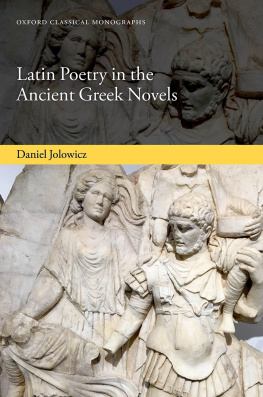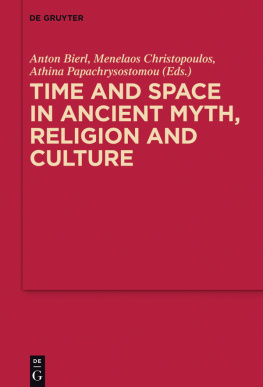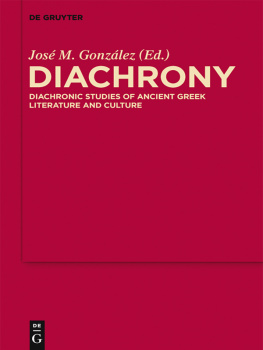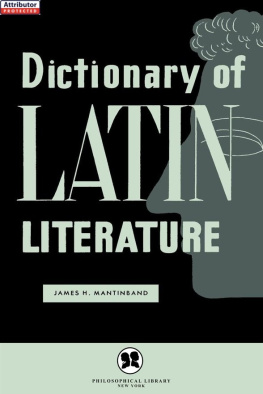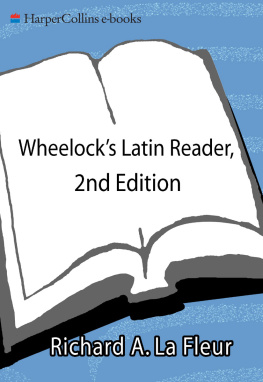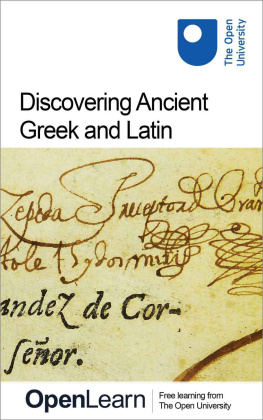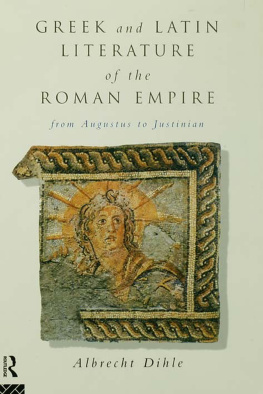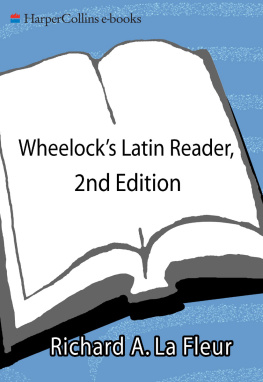Oxford Classical Monographs
Published under the supervision of a Committee of the Faculty of Classics in the University of Oxford
The aim of the Oxford Classical Monographs series (which replaces the Oxford Classical and Philosophical Monographs) is to publish books based on the best theses on Greek and Latin literature, ancient history, and ancient philosophy examined by the Faculty Board of Classics.

Great Clarendon Street, Oxford, OX2 6DP, United Kingdom
Oxford University Press is a department of the University of Oxford. It furthers the Universitys objective of excellence in research, scholarship, and education by publishing worldwide. Oxford is a registered trade mark of Oxford University Press in the UK and in certain other countries
Daniel Jolowicz 2021
The moral rights of the author have been asserted
First Edition published in 2021
Impression: 1
All rights reserved. No part of this publication may be reproduced, stored in a retrieval system, or transmitted, in any form or by any means, without the prior permission in writing of Oxford University Press, or as expressly permitted by law, by licence or under terms agreed with the appropriate reprographics rights organization. Enquiries concerning reproduction outside the scope of the above should be sent to the Rights Department, Oxford University Press, at the address above
You must not circulate this work in any other form and you must impose this same condition on any acquirer
Published in the United States of America by Oxford University Press
198 Madison Avenue, New York, NY 10016, United States of America
British Library Cataloguing in Publication Data
Data available
Library of Congress Control Number: 2020949010
ISBN 9780192894823
ebook ISBN 9780192647740
DOI: 10.1093/oso/9780192894823.001.0001
Printed and bound by
CPI Group (UK) Ltd, Croydon, CR0 4YY
Links to third party websites are provided by Oxford in good faith and for information only. Oxford disclaims any responsibility for the materials contained in any third party website referenced in this work.
Acknowledgements
In writing this monograph, which is a drastically revised, rethought, and expanded version of an Oxford DPhil thesis submitted in 2015, I have racked up considerable debts of gratitude. I would like to register some of these here. I first addressed the question of imperial Greek engagement with Latin poetry in an MSt dissertation supervised by Steve Heyworth, which then developed into a doctoral thesis supervised by Tim Whitmarsh (for the first three years) and Steve again (for the fourth year). Both intellectually and personally, my debt to Tim and Steve is profound. In converting thesis to book I have benefited immensely from the unstinting support of Stephen Harrison, who, as book advisor, read the entire manuscript multiple times and patiently fielded a bewildering array of queries generated by my fevered brain. Prodigious thanks are further owed to Ewen Bowie and (again) Tim Whitmarsh, who likewise read the entire manuscript and made me think harder about points of detail as well as the bigger picture. My doctoral examiners, Stephen Harrison and Richard Hunter, as well as the anonymous reader for the Press, provided stewardship and guidance fundamental to the transition from the thesis bulla to the monographs toga uirilis. All of these people have exhibited a generosity of time and spirit for which I shall be in arrears indefinitely. Brutally quantitative evidence of their impact on my thinking can be found in the extent to which they inhabit the pages of the bibliography.
It is also a pleasure to record my sincere gratitude to those whose kindness and good offices helped shepherd the book to completion, and whose interventions frequently provided much needed ballast in less predictable waters. The Introduction has been immeasurably sharpened by the trenchant criticisms of Owen Hodkinson, Stephen Oakley, Michael Trapp, and Chris Whitton; I owe to Nick Denyer the term predicative synecdoche used in Section . Individual queries on a range of matters have been graciously and generously fielded by Amin Benaissa, Aitor Blanco Prez, Thomas Coward, Scott DiGiulio, Aneurin Ellis-Evans, Leofranc Holford-Strevens, Talitha Kearey, Fiachra Mac Grin, Hugh Mason, Valeria Pace, Chris Pelling, Susan Stephens, and Nick Zair. I have profited greatly from those colleagues who, at various times and in various ways, offered themselves as interlocutors, and without whom the process would have been far more solitary and far less rewarding: David Butterfield, Gabe Byng, Nicol DAlconzo, Koen De Temmerman, Ja Elsner, Simon Goldhill, Will Guast, Larry Kim, Emily Kneebone, Benedek Kruchi, Dawn LaValle Norman, Anna Lefteratou, Tom Mackenzie, John Morgan, Ben Raynor, Ian Repath, Joyce Reynolds, Helena Schmedt, Henry Spelman, Estelle Strazdins, Aldo Tagliabue, Brynja Thorgeirsdottir, Stephen Trzaskoma, and Kreimir Vukovi. I would also like to thank Romain Brethes, David Elmer, Richard Hunter, Beatrice Poletti, and Bruno Rochette for sharing unpublished work with me. It is, finally, a privilege to acknowledge the teachers that helped get my Greek up and running, Alex Humes and Stephen Mann.
I am lucky to have been the recipient of financial and institutional support that has enabled this project to come to fruition. An AHRC scholarship secured bed and board at Magdalen College, Oxford, for the first three years of doctoral study, and Corpus Christi College, Oxford, offered me employment as a stipendiary lecturer for the fourth. The bulk of the book was written in the environs of Clare Hall, Cambridgea genuine locus amoenusin my capacity as Isaac NewtonAnn Johnston Research Fellow. I completed the final stages of the book while employed in teaching capacities by the Faculty of Classics, Cambridge, and by my current home, Kings College London. I owe a great deal to all of these institutions (which have kept me in business) and to the vibrant communities of which they are composed.
My most personal thanks are reserved for those who already know that, without them, none of this would have happened: for my teammate in life, Elle; for my mother and father, Corinna and Philip; for my brother, Tommy; and for my grandparents, Drosoulla and Tommy, Grace and Bobby. It is to this family unit that I dedicate this book.
D.A.J.
Farnham, July 2020
As this volume was going to press, we celebrated the arrival of Callirho. It is fitting that she crowns the dedication.
D.A.J.
Farnham Common, December 2020
Contents
Extended Latin quotations are taken from the Oxford Classical Text where possible: R. A. B. Mynors 1969 for Vergil; S. J. Heyworth 2007 for Propertius; J. P. Postgate 19152 for Tibullus; E. J. Kenney 1995 for Ovids Amores and Ars; R. J. Tarrant 2004 for Ovids Metamorphoses. For Ovids Heroides I use the Loeb edition of G. Showerman 1914 (revised by G. P. Goold 1977), and for Ovids Tristia and Epistulae ex Ponto I use the Loeb edition of A. L. Wheeler 1924 (revised by G. P. Goold 1996). The editions of the Greek novels are as follows: B. P. Reardons 2004 Teubner for Chariton; J.-P. Garnauds 1991 Bud for Achilles Tatius; M. D. Reeves 1982 Teubner for Longus.
Translation of Latin texts frequently takes the Loeb editions as a starting point, which are subjected to adaptation. Translation of the Greek novels takes the following as a guide (again, with adaptations): G. P. Goolds 1995 Loeb for Chariton; T. Whitmarshs 2001

